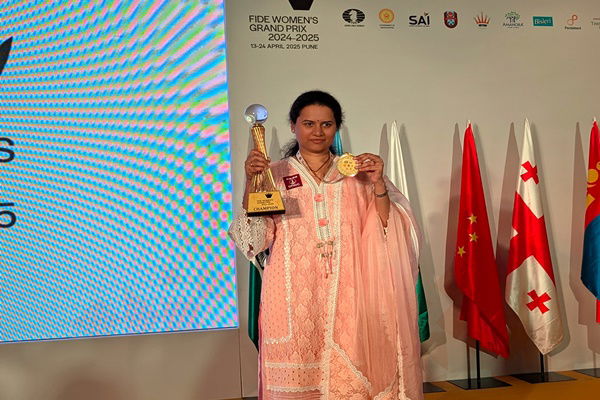Indian Chess Grandmaster Koneru Humpy wins Pune FIDE Women’s Grand Prix

Pune FIDE Women’s Grand Prix 2025
1. Event Overview
- Tournament: Pune FIDE Women’s Grand Prix 2025.
- Format: 9-round Swiss/round-robin (standard FIDE format).
- Participants: Top female Grandmasters and International Masters globally.
2. Key Indian Achievements
- Koneru Humpy:
- Won final round with White pieces against Bulgarian IM Nurgyul Salimova.
- Scored 7/9 points; shared first place with Chinese GM Zhu Jiner on points but secured top position via tiebreaks.
- Significance: Boosts qualification chances for next Women’s Candidates Chess tournament.
- Divya Deshmukh:
- Drew against Polish IM Alina Kashlinskaya.
- Finished 3rd with 5.5/9 points, showing consistent top-level performance.
- Zhu Jiner:
- Also scored 7/9 but placed second on tiebreaks; prize money and Grand Prix points shared with Humpy.
3. Analytical Observations
- India’s growing stature in women’s chess:
- Both Humpy and Deshmukh performing at elite level indicates a deepening talent pool.
- Follows on from Divya Deshmukh’s FIDE Women’s World Cup win and Humpy’s historic achievements.
- Competition and parity:
- Close scores and tiebreaks reflect highly competitive international field.
- Strategic implications:
- Humpy’s win improves her prospects for the Women’s Candidates, increasing India’s representation in world championship cycles.
- Highlights the importance of consistent performance in Grand Prix series for qualification points.
4. Challenges & Considerations
- Tiebreak rules can determine final standings even when points are equal, reflecting nuances in international chess formats.
- Maintaining competitive edge requires regular exposure to global tournaments and training against top-tier opponents.
5. Significance
- Reinforces India’s global competitiveness in women’s chess, complementing men’s achievements (Gukesh Dommaraju, Praggnanandhaa).
- Provides role models for aspiring women chess players.
- Policy relevance:
- Supports arguments for institutional support, sponsorship, and chess academies for women.
- Demonstrates benefits of long-term investment in intellectual sports.
Updated - April 24, 2025 8:39 AM | News On Air
Koneru Humpy Divya Deshmukh Pune FIDE Women’s Grand Prix 2025 Zhu Jiner Nurgyul Salimova Polina Shuvalova Alina Kashlinskaya Women’s Candidates Chess Tournament FIDE Grand Prix Points Chess Tiebreaks Indian Women in Sports Chess Rankings 2025 Global Chess Competition UPSC Current Affairs Sports GK Women Empowerment in Chess Indian Chess Achievements